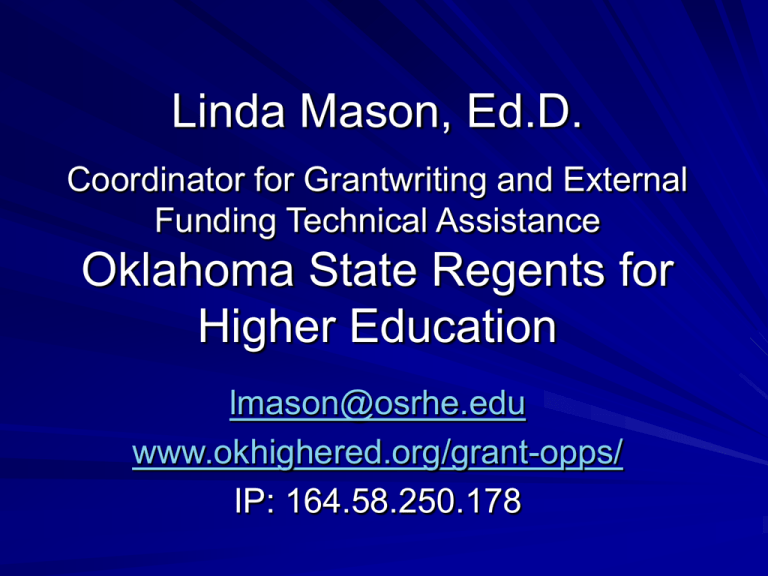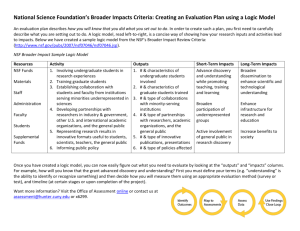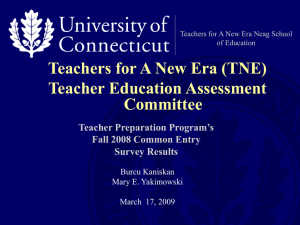Linda Mason, Ed.D. Oklahoma State Regents for Higher Education
advertisement

Linda Mason, Ed.D. Coordinator for Grantwriting and External Funding Technical Assistance Oklahoma State Regents for Higher Education lmason@osrhe.edu www.okhighered.org/grant-opps/ IP: 164.58.250.178 HOW TO GET STARTED IN RESEARCH http://www.cur.org/publications.html COUNCIL ON RESEARCH (CUR) – 1999 RESEARCH POLICY AS AN AGENT OF CHANGE – WORKSHOP REPORT http://transcoder.usablenet.com/tt/http://w ww.nsf.gov/pubs/2005/nsf05209/start.htm NSF - 2003 How to Get Started in Research CUR Why do research with undergraduates? – Science is a method, not a body of knowledge – Learning a new research language, i.e. symbols, names, formulas, concepts – Environment for developing problem-solving skills – Make original contributions and test them How to Get Started in Research CUR Support from the Administration, Department Chair, and Colleagues – One committed person – contagious enthusiasm – Important pedagogy – Recruitment of top notch students – “Checklist of Institutional Support for Research” by Professor Jack Pladziewicz, University of Wisconsin-Eau Claire How to Get Started in Research CUR Get started in research early in your career. – Sustain graduate training as a scientist – Enable you to be active in research 20 years from now – Important to submit proposals within 2-3 years of starting teaching career: funding agency won’t readily grant to experienced teacher who is a nonresearcher. – Network of other researchers – Exposure to similar works – Refine own thinking – Exposure to new research efforts – Engage in grant writing prior to going to first job How to Get Started in Research CUR Benefits of Undergraduate Research – Attracts bright young people to the field – Can be a major force in career decisions – Interrelates science with composition and speech – Keeps mentor faculty current – enrich their teaching – Increase in morale, self-esteem & satisfaction in working with intelligent & stimulating students – Positive professional contacts in scientific meetings Planning Significant amount of time in preliminary planning Select a Research Area Research-quality Instrumentation Funding to Support the Research Academic Year Versus Summer Selection of Research Students Curiosity Dedication Common Sense Proper Motivation Group Dynamics Students should begin early Variety of levels of research experience,i.e., senior students, beginners, high school teachers, industrial retirees Research Presentations Oral presentations Poster presentations State, regional or national meeting – Campus Research Day – Capitol Research Day – UCO Research Day – NCUR – Asheville, N.C. Get by with a little help from your friends….. Time and money important Collegial interaction Institutional support Interaction via OneNet, email, website, videoconference Interact with experts and superstars Contact other Primarily Undergraduate Institutions Research Policy as an Agent of Change - NSF Economics Politics Individuals Ethics Democracy Social mores – social acceptance Risks Research Policy as an Agent of Change - NSF What advantages and disadvantages accrue to universities that engage heavily in research? How does research funding interact with internal institutional resource allocation? Does involvement of public universities in research diminish institutional resource allocations to undergraduate instruction? Research Policy as an Agent of Change - NSF Job creation versus wealth creation How do individuals and various groups benefit from research? Are they best served by economic growth? Public health? New technologies? What are the roles of people and organizations that are not conventional research? “Paraknowledge” about science and research – is this good? Research Policy as an Agent of Change - NSF Consequences of research policy – Staffing by postdocs at minimum salary – Economic growth – Job creation – Wealth creation – Prediction of future – Solution of problems Research Policy as an Agent of Change - NSF Unintended consequences of research policy – – – – – – – – Increase of foreign nationals Increase of political secrecy Leaks of partially trained people into other fields Lifestyle changes of individuals Financial conflicts of interest Research institutions becoming more political Unexpected ethical and legal issues Unexpected future – uncertainty about forward movement – Unexpected problems created – Strange bedfellows Research policy – or the absence of it – will change. It is important for the policy makers to think about the change and direct policy in a wise way.

